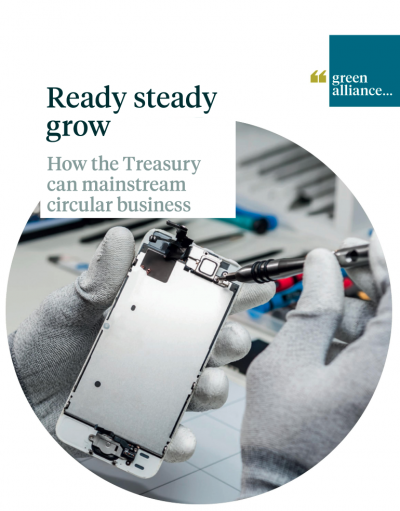Green Alliance report recommends tax adjustments to help circular economy
Charity and think tank Green Alliance’s ‘Ready steady grow’ report has revealed the barriers to the growth of the circular economy, providing recommendations to the Treasury to fix this.
 The circular economy differs from the ‘take, make, use and throw’ model currently in place through the linear (non-circular) economy. Instead, the objective is to keep materials in circulation for as long as possible, preserving them at their highest value.
The circular economy differs from the ‘take, make, use and throw’ model currently in place through the linear (non-circular) economy. Instead, the objective is to keep materials in circulation for as long as possible, preserving them at their highest value.
There are several measures that characterise circular models. These can include: designing for longevity, systems of reuse and sharing, and ‘reverse supply chains’ that collect goods for reprocessing, resale or redistribution.
Though recycling possesses an important role, the waste hierarchy of the circular economy prioritises the reuse and remanufacturing of materials to ensure the maintenance of value.
What are the economic benefits of the circular economy?
WRAP estimates that by switching to the circular economy, gross value added could rise by £82 billion by the year 2030. Moreover, Cambridge Econometrics indicate it could contribute to a one per cent rise in GDP by 2035.
Studies indicate that the economic benefits of moving to a circular economy stem from increased consumer spending power alongside the establishment of higher-paid jobs. For example, for every thousand tonnes of waste, there are two jobs in recycling compared to 0.1 jobs in waste treatment and disposal.
The Green Alliance report highlights that due to the structure of the UK economy – with low levels of extractive industries and primary manufacturing – it is well positioned to gain significantly from the circular economy. It also estimates that the creation of more high-skilled circular jobs is likely to benefit regions with higher unemployment rates such as Wales and the East Midlands.
What is holding the circular economy back?
Through the analysis of ten case studies on circular businesses, the Green Alliance report finds that current business and consumer habits pose a significant barrier to the adoption of the circular economy, especially in the field of leasing or rental. Preferences for cheap, easily accessible and poorer quality goods have prevented growth for circular businesses that offer greater longevity in their products.
Green Alliance highlights the existence of an unlevel playing field in taxation as a significant barrier to the development of the circular economy. The current taxation system disadvantages circular practices, with VAT rules uniform across both the linear and circular economies despite the environmental advantages of the latter. This, therefore, means that reused and remanufactured goods find themselves taxed multiple times.
Additionally, the report finds that high upfront costs have created challenges for the growth of circular businesses, with consumers often reluctant to purchase circular products due to the added cost burden.
How can the Treasury help grow the circular economy?
The report recommends three proposals that the Treasury should consider to help the growth of the circular economy.
The first recommendation is that the Treasury ‘levels the playing field’ between the circular and linear economy. To encourage repair and make it more affordable, the report argues that VAT should be zero-rated, prioritising high-impact waste like electronics. Green Alliance proposes that this should include spare parts and labour.
The report also states that tax reliefs for leasing businesses would help level the playing field. Tax relief schemes, such as the Seed Enterprise Investment Scheme (SEIS), are often inaccessible. Under current rules, new businesses are ineligible if their gross assets – such as rented vehicles or clothing – reach £200,000.
The second recommendation Green Alliance proposes to the treasury is to provide financial assistance to new circular businesses. The report claims that a majority of funding surrounding waste currently goes towards treating waste arising from the linear economy rather than helping nurture an economy that designs from waste.
The charity recommends a dedicated £800 million fund to address this imbalance and help kickstart new circular businesses. It claims this will help overcome the barrier of high upfront costs.
Finally, the report proposes that a greater understanding of the impacts of tax is needed. Evidence of the impact of tax measures is not currently routinely collected and an assessment of whether environmentally motivated tax reliefs contribute to their social and economic objectives has not been conducted.
Approaches to creating widespread change require an in-depth understanding of how policy will affect behaviour. It is often assumed that consumer activity is primarily motivated by cost, but this oversimplifies the numerous decisions consumers make. Green Alliance suggests that policy ideas should therefore be tested with both the public and business at their earliest stages and that concerns around convenience, trust and fairness should be brought into consideration.










